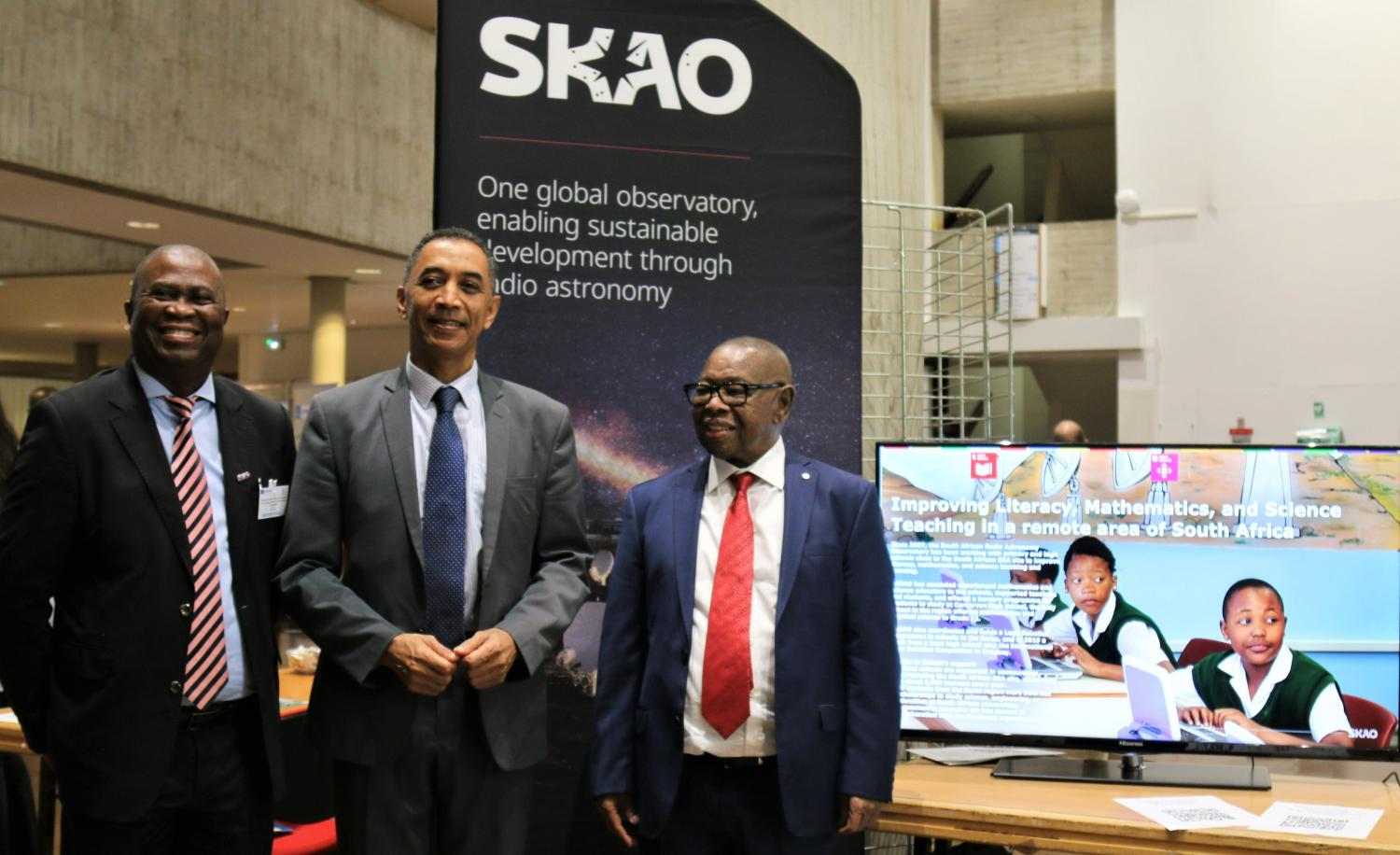UN year of basic sciences for sustainable development officially launched

South Africa’s minister of higher education, science, and innovation, Dr Blade Nzimande (right), visited the SKA Observatory stand at the opening ceremony of the International Year of Basic Sciences for Sustainable Development. On the left is the department's director-general, Dr Phil Mjwara, who is also deputy chair of the SKAO Council, with special adviser Prof Derrick Swartz between them.
Basic sciences can be praised in many ways: from an instrument that probes the soul of the Universe to helping fulfil a deep human need.
For the next year, the world’s focus will fall on basic sciences as the “beating heart” of sustainable development, though.
Several national ministers, Nobel laureates, and other high-ranking scientists, leaders, and policymakers used these descriptions at the opening ceremony of the International Year of Basic Sciences for Sustainable Development (IYBSSD). The full-day event took place on Friday 8 July in Paris at the headquarters of UNESCO, the UN’s specialised agency for education, science, and culture. More than 200,000 people reportedly followed the proceedings online from China alone.
The SKA Observatory (SKAO) is a sponsor of the international year and sits on its steering committee with 50 other organisations covering a range of basic sciences, such as astronomy, chemistry, and biology. These include fellow intergovernmental organisations CERN and ITER as well as the International Astronomical Union. Another 110 academies, networks, and associations have signed supporting agreements.
Sustainability a foundational value of SKAO
The launch event featured three round-table discussions and a keynote speech by the African Union commissioner for education, science, technology and innovation, Prof. Mohamed Belhocine. Speakers emphasised that governments must ensure the basic sciences are well-funded, that women and girls are welcomed, and that scientists need to share their work with the wider public.
“Without new knowledge, we are incapable of understanding our past and present and possible futures. Basic sciences are foundational to all forms of human knowledge,” said the South African minister of higher education, science, and innovation, Dr Blade Nzimande. He was joined at the event by the department's director-general, Dr Phil Mjwara, who is also deputy chair of the SKAO Council.
Sustainability is a foundational value of the SKAO. The Observatory and its partners are already contributing to 14 of the 17 Sustainable Development Goals (SDGs) that the UN has set for 2030. Prominent ones include building capacity and skills in SKAO member countries, generating innovation, and boosting economies.
‘Increase Observatory’s visibility beyond astronomy’
Events on the cards to showcase the IYBSSD include a conference on each continent. The first one, on science and ethics for sustainable development, will take place in Vietnam in early September, with the World Conference on Basic Sciences and Sustainable Development opening a week later in Serbia.
The SKAO and its partners will play an active role in organising or taking part in such events.
“International years are a great way to bring people together under a common theme and promote and raise awareness about the topic,” said the SKAO’s Director of Communications, Outreach and Education, William Garnier.
“The SKAO can showcase the impact we’ve been having and are planning to have on the UN Sustainable Development Goals, increase our visibility beyond astronomy, and further position the Observatory as a responsible and sustainable global research infrastructure.”
The IYBSSD will close with the inauguration of the CERN Science Gateway, a new visitor centre, in Switzerland in October 2023.
Find information about the IYBSSD and sign up for a newsletter on the official website.




